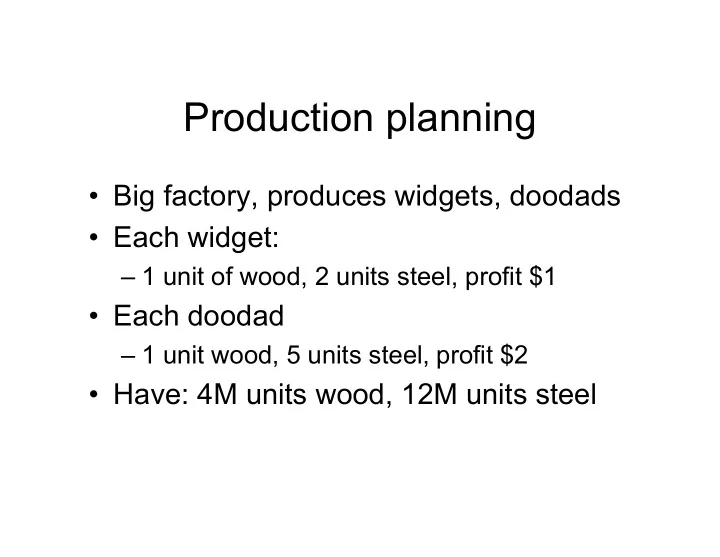

Production planning • Big factory, produces widgets, doodads • Each widget: – 1 unit of wood, 2 units steel, profit $1 • Each doodad – 1 unit wood, 5 units steel, profit $2 • Have: 4M units wood, 12M units steel
A wrinkle • Due to limitations of machinery, must produce in lots of exactly 1M widgets or 1M doodads
Effect of integrality
Integer linear programs • max c T x s.t. E.g., max s.t. Ax + b ≥ 0 Cx + d = 0 x integer
Variations • Mixed integer linear program (MILP) • Integer quadratic program • 0-1 ILP
Combinatorial optimization • Roughly, any optimization problem whose decision version is in NP • ILP, MILP, 0/1 IP:
Applications • SAT • MAXSAT
Applications • Facility location problem: – have n stores, at positions y 1 , y 2 , … – can build m warehouses, at x 1 , x 2 , … – minimize distance from each store to nearest warehouse • Extra vars: • min s.t.
Embedding logic in MILPs • z ==> a T x + b ≥ 0 • OR: • k-of-n:
Piecewise-linear functions
Applications • Planning (e.g., STRIPS)
Have cake & eat it as CNF
Applications • Scheduling
Solving combinatorial optimization problems • Two basic strategies • And,
Basic search • Schema: if n 0/1 variables, {0, 1, *} n • E.g., • Schema is full if no *s: e.g., • Notation: schema/(variable → value) • E.g., 10**1/(x 3 → 1) =
Basic search [schema, value] = search(F, sch) • If full(sch): return [sch, F(sch)] • pick a variable x i • [sch (0) , v (0) ] = search(F, sch/(x i → 0)) • [sch (1) , v (1) ] = search(F, sch/(x i → 1)) • if v (0) ≥ v (1) return [sch (0) , v (0) ] else return [sch (1) , v (1) ]
Exercise • SAT problem w/ XOR constraints: search(a ⊕ b ^ b ⊕ c ^ c ⊕ a, ***) • How many total calls to search()?
search(a ⊕ b ^ b ⊕ c ^ c ⊕ a)
Constraint propagation • Start w/ table of feasible values • When we set a var, look at its constrs – e.g., set a = 0: – • If a domain becomes empty: • If one becomes singleton:
Search tree
Relaxation • min f(x) s.t. x ∈ S 1 (*) • min g(y) s.t. y ∈ S 2 (**) • (*) is a relaxation of (**) if: – – • Example:
Why are relaxations useful? • Relaxation may be • From solution of relaxed problem: • Suppose x*, y* are optimal solutions to original / relaxed problems – we know:
Example: have & eat LP … min 5s 1 + 5s 2 + … + 5s 19 + s 20 + 2s 21 s.t. … h 2 + (1–B 2 ) + (1–M 2 ) ≥ 1–s 15 (1–e 2 ) + e 1 + M 2 ≥ 1–s 16 … 0 ≤ M 1 , h 1 , e 1 , M 2 , B 2 , h 2 , e 2 , s 1 , …, s 21 ≤ 1
How should we relax?
Combine relaxation w/ search • Given a schema: e.g., • Substitute in fixed variables • Relax integrality constraints for *s • Solve relaxation • Quiz: in min problem, lower value for relaxation w/ or ? – A:
A random 3-CNF formula
Example search tree
Branch & bound [schema, value] = bb(F, sch, bnd) • [v rx , rsch] = relax(F, sch) • if integer(rsch): return [rsch, v rx , bnd] • if v rx ≥ bnd: return [sch, v rx , bnd] • Pick variable x i • [sch (0) , v (0) ] = bb(F, sch/(x i → 0), bnd) • [sch (1) , v (1) ] = bb(F, sch/(x i → 1), min(bnd, v (0) )) • if (v (0) ≤ v (1) ): return [sch (0) , v (0) ] • else: return [sch (1) , v (1) ]
Recommend
More recommend